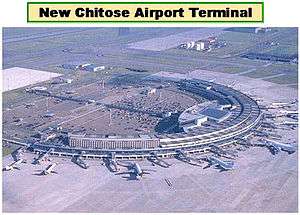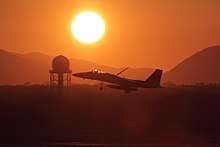New Chitose Airport
| New Chitose Airport 新千歳空港 Shin-Chitose Kūkō | |||||||||||||||||||||||
|---|---|---|---|---|---|---|---|---|---|---|---|---|---|---|---|---|---|---|---|---|---|---|---|
 New Chitose Airport | |||||||||||||||||||||||
| Summary | |||||||||||||||||||||||
| Airport type | Public | ||||||||||||||||||||||
| Operator |
Civil Aviation Bureau Hokkaidō Airport Terminal Co., Ltd. (terminal) | ||||||||||||||||||||||
| Serves | Sapporo metropolitan area | ||||||||||||||||||||||
| Location | City of Chitose and Tomakomai | ||||||||||||||||||||||
| Elevation AMSL | 70 ft / 21 m | ||||||||||||||||||||||
| Coordinates | 42°46′31″N 141°41′33″E / 42.77528°N 141.69250°ECoordinates: 42°46′31″N 141°41′33″E / 42.77528°N 141.69250°E | ||||||||||||||||||||||
| Website |
www | ||||||||||||||||||||||
| Map | |||||||||||||||||||||||
 CTS New Chitose Airport in Japan  CTS CTS (Japan) | |||||||||||||||||||||||
| Runways | |||||||||||||||||||||||
| |||||||||||||||||||||||
| Statistics (2015) | |||||||||||||||||||||||
| |||||||||||||||||||||||
|
Source: Japanese Ministry of Land, Infrastructure, Transport and Tourism[2] | |||||||||||||||||||||||
New Chitose Airport (新千歳空港 Shin-Chitose Kūkō) (IATA: CTS, ICAO: RJCC) is an international airport located 2.7 NM (5.0 km; 3.1 mi) south-southeast of Chitose[3] and Tomakomai, Hokkaidō, Japan, serving the Sapporo metropolitan area. By land area, it is the largest airport in Hokkaidō.
It is adjacent to Chitose Air Base, a Japan Air Self-Defense Force base which houses F-15 Eagle fighter jets, the Japanese Air Force One government aircraft and a number of smaller emergency response aircraft and helicopters. Chitose and New Chitose have separate runways but are interconnected by taxiways, and aircraft at either facility can enter the other by ground if permitted; the runways at Chitose are occasionally used to relieve runway closures at New Chitose due to winter weather. JASDF provides air traffic control for both facilities.
As of 2005, New Chitose Airport was the third-busiest airport in Japan (behind Narita and Haneda), although it has now dropped to fifth, and ranked 64th in the world in terms of passengers carried.[4] The 819 km (509 mi) Sapporo–Tokyo Haneda route is the second busiest air route in the world (behind Seoul-Gimpo–Jeju), with 7.8 million passengers carried in 2015.[5]
History
New Chitose opened in 1991 to replace the adjacent Chitose Airport, a joint-use facility which had served passenger flights since 1963. The airport's IATA airport code was originally SPK. This code was later adopted as a city code to refer to both New Chitose and the smaller Okadama Airport in central Sapporo, which handles commuter flights within Hokkaido.
New Chitose became Japan's first 24-hour airport in 1994. Services between 10 PM and 7 AM are currently limited to six flights per day due to noise alleviation concerns. Four of these slots are currently used by passenger flights to Tokyo while the other two are used by cargo flights.
New Chitose previously had long-haul service to Amsterdam (KLM, 1997–2002), Cairns (Qantas, 1992–1998 and 2004–2007) and Honolulu (JALWays, 1992–2003, Hawaiian Airlines since 2012). Today, its services to Europe have ceased, while its international services are mainly transporting tourists from the rest of Asia and for sightseeing and skiing. The area surrounding gates 0 through 2, on the north end of the main terminal, was a sterile area for international flights until the international terminal opened for service on March 26, 2010.
The airport was upgraded with additional private aircraft handling facilities for the 34th G8 summit, held in Hokkaido in 2008.
Due to the airport's sharing of air traffic control with Chitose Air Base, daytime civil operations are limited to 32 takeoffs and landings per hour, and operations by certain foreign aircraft (including Chinese and Russian aircraft) are prohibited on Mondays and Thursdays. These restrictions are scheduled to be eased in March 2017.[6] A 2nd terminal is being built roughly doubling the existing terminal and capacity, scheduled to be complete by August 2019.[7]
 Airport diagram. Civil flights use the parallel runways to the southeast; JASDF flights use the parallel runways to the northwest.
Airport diagram. Civil flights use the parallel runways to the southeast; JASDF flights use the parallel runways to the northwest.- Terminal building
 Domestic terminal atrium
Domestic terminal atrium.jpg) International terminal
International terminal.jpg) International departures area
International departures area
 F-15J at Chitose Air Base (2010)
F-15J at Chitose Air Base (2010)
Accidents and incidents
- On February 23, 2016, Japan Airlines Flight 3512, a Boeing 737 about to depart Chitose for Fukuoka Airport, was evacuated in the midst of a snowstorm due to smoke in the cabin caused by an engine problem. Three passengers were injured in the evacuation.[8]
Airlines and destinations
The airport has a semicircular domestic terminal with eighteen gates, and a smaller international terminal with six gates. Operating hours for international flights at CTS are restricted by the Japanese government in order to avoid interference with JASDF operations at the adjacent air base. As of April 2012, international flights are permitted on Tuesdays and Wednesdays from noon to 4 pm, and from 5 pm on Friday through 11:59 pm on Sunday.[9]
Passenger

Cargo
| Airlines | Destinations |
|---|---|
| ANA Cargo | Tokyo–Haneda |
Other facilities
The domestic terminal contains a 188-room hotel, the Air Terminal Hotel .
China Airlines operates its Sapporo office on the third floor of the airport building.[18]
The airline Hokkaido Air System was at one time headquartered in the New Chitose airport terminal.[19] Now its head office is on the property of Okadama Airport in Higashi-ku, Sapporo.[20]
Ground transportation
Rail
New Chitose Airport Station is located on a spur off the Chitose Line of Hokkaido Railway Company (JR Hokkaido). Rapid service trains operate to and from Sapporo Station, taking 36–39 minutes and costing ¥1,070.[21]
Bus
- Hokkaidō Chūō Bus/Hokuto Kotsu joint service (Sapporo 4 trips/h, Oyachi 4 trips/h)
- Hokkaidō Chūō Bus (Asabu 1–2 trips/h, Miyanosawa 1–2 trips/h)
- Hokuto Kotsu (Apa Hotel & Resort 2 trips/h, Maruyama Park hourly)
- Donan Bus (Tomakomai 1–2 trips/h, Noboribetsu 3 trips/day, Muroran 12 trips/day, Hobetsu 2 trips/day, Urakawa 2 trips/day)
- Atsuma Bus (Atsuma 3 trips/day)
References
- 1 2 18R/36L and 18L/36R are part of Chitose Air Base and operated by the Japan Air Self-Defense Force
- ↑ "New Chitose International Airport" (PDF). Japanese Ministry of Land, Infrastructure, Transport and Tourism. Archived from the original (PDF) on 21 October 2016. Retrieved 7 January 2017.
- ↑ "AIS Japan". Aisjapan.mlit.go.jp. Archived from the original on 2016-05-17. Retrieved 2014-05-19.
- ↑ "Total Number of Domestic/International Passengers since the Opening of New Chitose Airport-Other Data | New Chitose Airport Terminal". Hokkaido-kukou.jp. 1988-07-20. Retrieved 2014-05-19.
- ↑ "特定本邦航空運送事業者に係る情報" (PDF). Mlit.go.jp. Retrieved 13 August 2018.
- ↑ "新千歳空港 17年春に発着枠拡大". Mainichi Shimbun. 22 April 2016. Retrieved 25 April 2016.
- ↑ "新千歳空港、国際線ビル2倍に 650億円投資". Nikkei.com. Retrieved 13 August 2018.
- ↑ Yamamoto, Arata (23 February 2016). "Japan Airlines Jet Evacuated After Engine Trouble, Cabin Smoke". NBC News. Retrieved 24 February 2016.
- ↑ "報道発表資料:新千歳空港への外国航空機乗り入れ時間帯の再設定について - 国土交通省". Mlit.go.jp. 2014-05-19. Retrieved 2014-05-19.
- ↑ "Air Busan expands Daegu - Japan service from Dec 2016". Routesonline.com. Retrieved 22 November 2016.
- ↑ "EastarJet adds Busan – Sapporo from May 2018". Routesonline.com. Retrieved 13 August 2018.
- ↑ "Hainan Airlines schedules new Sapporo flights in Jan 2017". Routesonline.com. Retrieved 13 August 2018.
- ↑ "Juneyao plans Nanjing – Sapporo service in 1Q18". Routesonline.com. Retrieved 13 August 2018.
- 1 2 "Peach expands Sapporo operation from Sep 2017". Routesonline.com. Retrieved 13 August 2018.
- ↑ "Peach launches Sendai base in Sep 2017". Routesonline.com. Retrieved 13 August 2018.
- ↑ http://www.pna.gov.ph/articles/1049795
- ↑ https://www.routesonline.com/news/38/airlineroute/280714/ural-airlines-schedules-sapporo-launch-in-dec-2018/
- ↑ "Northeast Asia Archived 2011-07-28 at the Wayback Machine.." China Airlines. Retrieved on August 30, 2011. "Sapporo 3F, New Chitose Airport, Bibi, Chitose City 066-0012, Hokkaido, Japan"
- ↑ "会社概要." Hokkaido Air System. Retrieved on May 19, 2009. "本社事務所 : 千歳市美々新千歳空港ターミナルビル内"
- ↑ "会社概要." Hokkaido Air System. Retrieved on August 30, 2011. "〒007-0880 札幌市東区丘珠町 丘珠空港内"
- ↑ "Hokkaido Shinkansen|HOKKAIDO RAILWAY COMPANY". 2.jrhokkaido.co.jp. Retrieved 13 August 2018.
External links
| Wikimedia Commons has media related to New Chitose Airport. |